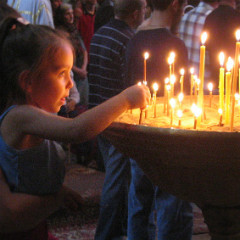Jesus tells us not to pray in public. But he doesn’t teach us to pray by ourselves.
The Lord addresses this in the Sermon on the Mount. Right after saying that we shouldn’t call attention to our charity, but rather do it in secret, Jesus tells his disciples to pray the same way. “And when you pray, you must not be like the hypocrites,” he says; “for they love to stand and pray in the synagogues and at the street corners, that they may be seen by men. . . . But when you pray, go into your room and shut the door and pray to your Father who is in secret; and your Father who sees in secret will reward you” (Matt 6.5-6).
Jesus directs his followers to pray in private, but he also assumes a certain togetherness, a community. Immediately after giving this correction, Jesus teaches us the Lord’s Prayer, the first word of which (at least in English) is our: “Our Father, who art in Heaven.” Not my, but our. That possessive pronoun indicates that we are not alone when we pray. The rest of the prayer follows suit, always using “us,” and never “me.” We call on God with others, even though we do it by ourselves in secret.
John Chrysostom draws out this point and elaborates it. We “make our prayer common, in behalf of our brethren also,” he says. In praying the Lord’s Prayer we take our brother and sister’s needs upon our hearts and tongues and even assume their presence as we pray. The individual Christian “offers up his supplications for the body [of Christ] in common, and nowhere look[s] to his own, but everywhere to his neighbor’s good.” The church is not divided. Rather, says Chrysostom, “we are all of us fellows . . . we are all of us knit together” (Homilies on the Gospel of Matthew 19.6).
This strikes me as a powerful corrective to selfishness and ambition. Not only do we refrain from public spectacle that would amplify our apparent (but false) piety in the eyes of others, but even when we pray secretly we put others before ourselves. We may be alone in our living room in the early-morning hours, may be sitting in our car in traffic, may be out for a quiet walk, but we are invited, even directed, in those moments of solitude to hold up our brothers and sisters in Christ.
“Our Father,” we start, continuing with “Give us this day our daily bread; and forgive us our debts, as we also have forgiven our debtors; and lead us not into temptation, but deliver us from evil.”
There is no room for conceit or ego here, nor pride or selfish concern. Christian prayer is a family affair and assumes the reality of the church, the reality of our togetherness, the reality of our being knit one to another, as Chrysostom says. Even in private, we come before God as a people.













